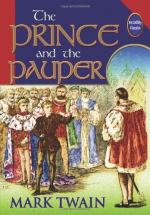Hendon was watching the King. He said to himself, with satisfaction, “His disorder mendeth; he hath changed, and groweth gentler. If he had followed his wont, he would have stormed at these varlets, and said he was King, and commanded that the women be turned loose unscathed. Soon his delusion will pass away and be forgotten, and his poor mind will be whole again. God speed the day!”
That same day several prisoners were brought in to remain over night, who were being conveyed, under guard, to various places in the kingdom, to undergo punishment for crimes committed. The King conversed with these —he had made it a point, from the beginning, to instruct himself for the kingly office by questioning prisoners whenever the opportunity offered —and the tale of their woes wrung his heart. One of them was a poor half-witted woman who had stolen a yard or two of cloth from a weaver —she was to be hanged for it. Another was a man who had been accused of stealing a horse; he said the proof had failed, and he had imagined that he was safe from the halter; but no—he was hardly free before he was arraigned for killing a deer in the King’s park; this was proved against him, and now he was on his way to the gallows. There was a tradesman’s apprentice whose case particularly distressed the King; this youth said he found a hawk, one evening, that had escaped from its owner, and he took it home with him, imagining himself entitled to it; but the court convicted him of stealing it, and sentenced him to death.
The King was furious over these inhumanities, and wanted Hendon to break jail and fly with him to Westminster, so that he could mount his throne and hold out his sceptre in mercy over these unfortunate people and save their lives. “Poor child,” sighed Hendon, “these woeful tales have brought his malady upon him again; alack, but for this evil hap, he would have been well in a little time.”
Among these prisoners was an old lawyer—a man with a strong face and a dauntless mien. Three years past, he had written a pamphlet against the Lord Chancellor, accusing him of injustice, and had been punished for it by the loss of his ears in the pillory, and degradation from the bar, and in addition had been fined 3,000 pounds and sentenced to imprisonment for life. Lately he had repeated his offence; and in consequence was now under sentence to lose what remained of his ears, pay a fine of 5,000 pounds, be branded on both cheeks, and remain in prison for life.




